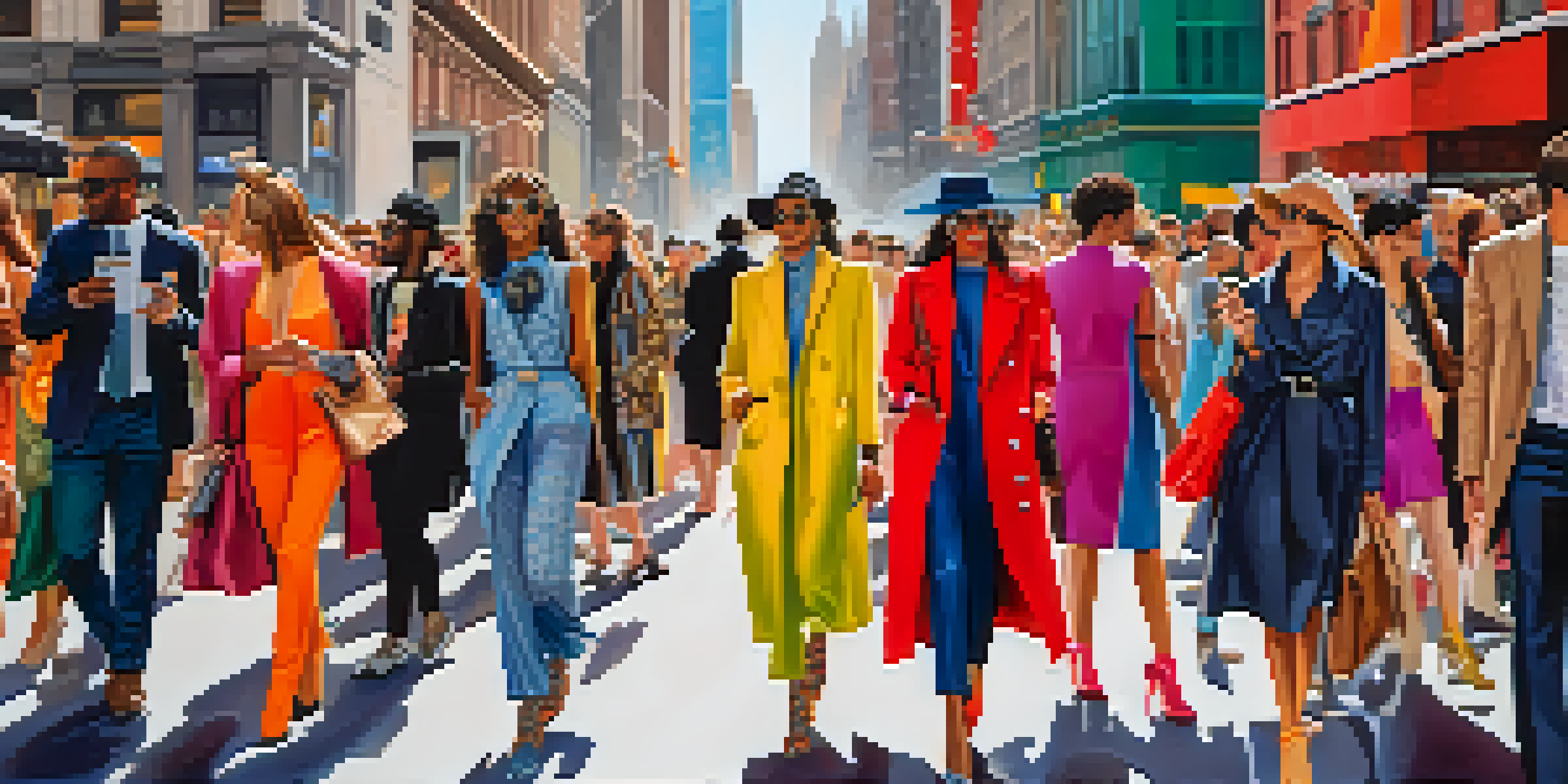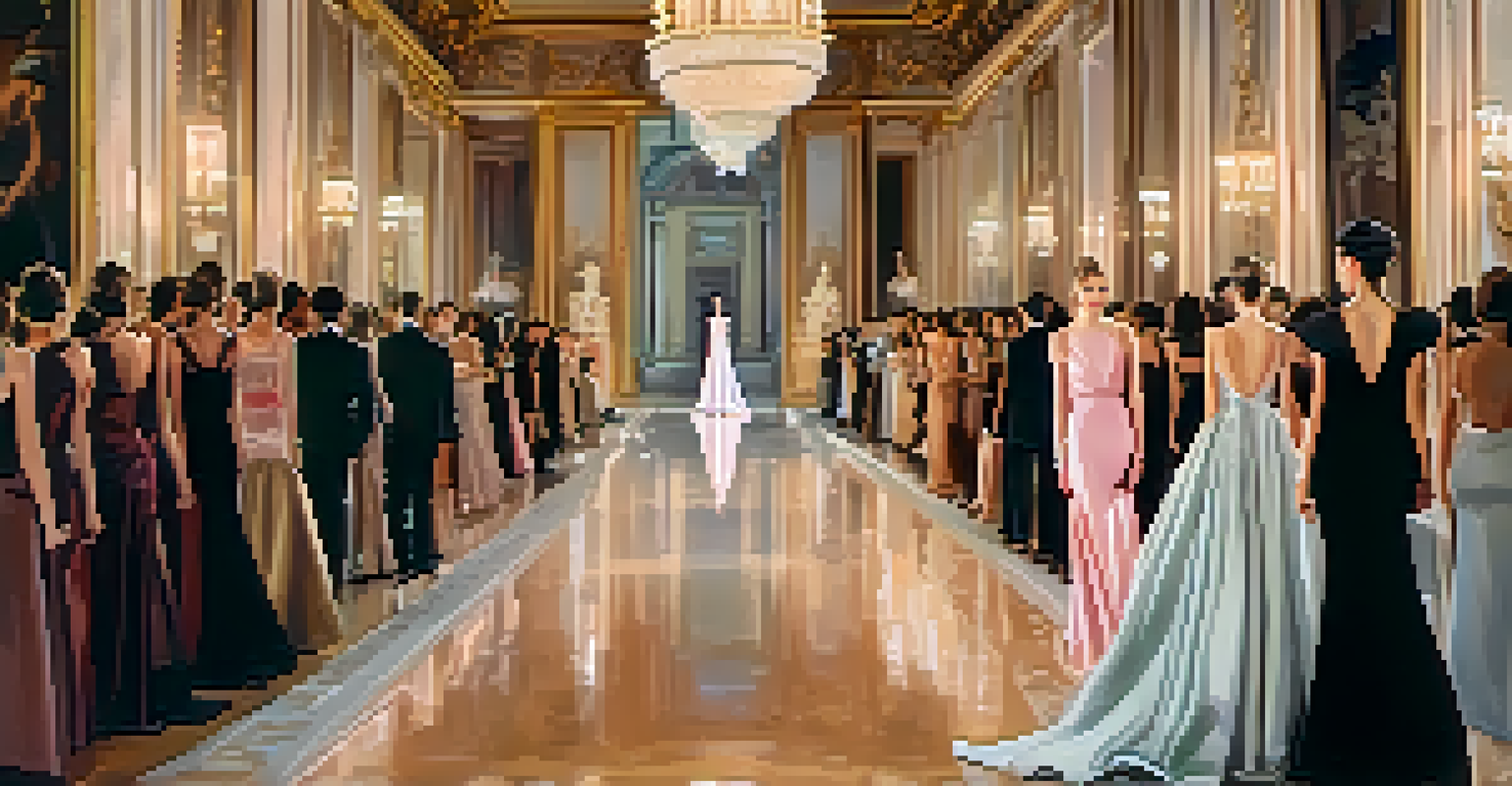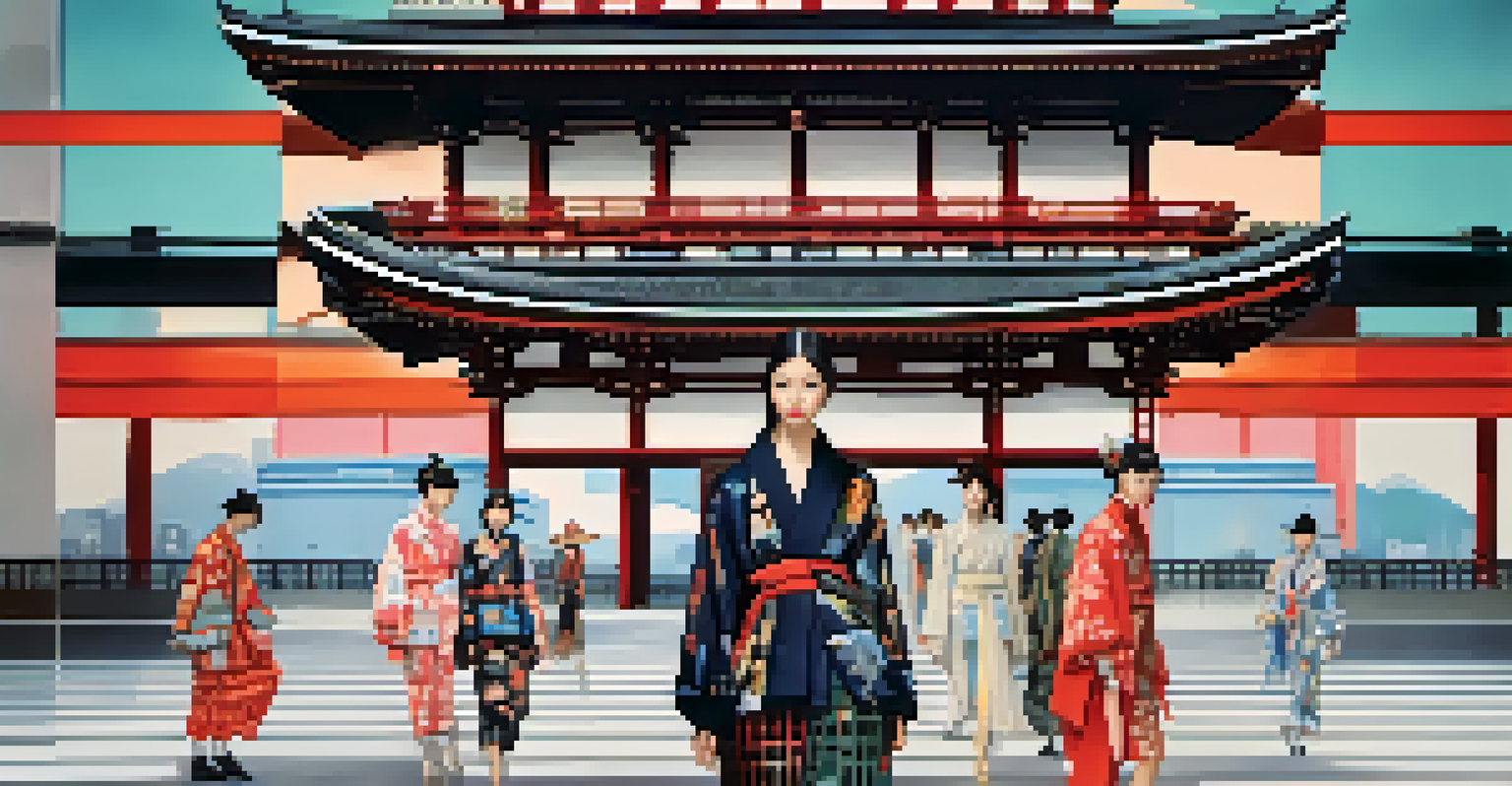Exploring Fashion Weeks: A Global Overview of Key Events

The Significance of Fashion Weeks in the Industry
Fashion weeks are pivotal events in the fashion calendar, where designers unveil their latest collections. These shows not only set trends for the upcoming seasons but also create a buzz that can catapult new designers into the spotlight. For fashion enthusiasts, attending these events is like being part of a glamorous spectacle, showcasing creativity and innovation.
Fashion is the armor to survive the reality of everyday life.
In essence, fashion weeks are barometers for the industry, indicating what styles, colors, and silhouettes will dominate the market. They play a crucial role in connecting designers with buyers, media, and influencers, all of whom are eager to capture the next big trend. As such, the excitement and anticipation surrounding these events are palpable, both on the runway and off.
Moreover, fashion weeks help to foster a sense of community among designers, models, and fashion lovers. They offer a platform for cultural exchange, where diverse influences come together to inspire and challenge one another. This collaborative spirit is what makes fashion weeks not just shows, but celebrations of creativity.
New York Fashion Week: The Trendsetter
New York Fashion Week (NYFW) is often regarded as the grand finale of the fashion month, kicking off the global series of events. Held bi-annually, it showcases a mix of established and up-and-coming designers, setting the tone for the season ahead. From iconic designers like Ralph Lauren to fresh talents, NYFW is a melting pot of creativity.

The energy during NYFW is electric, with celebrities, influencers, and fashionistas filling the front rows. The city itself seems to pulse with excitement, as street style becomes a spectacle of its own. Many attendees take this opportunity to express their unique fashion identities, turning the sidewalks into runways.
Fashion Weeks Set Industry Trends
Fashion weeks are crucial for showcasing new collections and determining upcoming trends in the fashion industry.
Additionally, NYFW has embraced digital innovation, allowing a wider audience to experience the shows through live streams and social media. This inclusion not only democratizes fashion but also broadens the reach of designers, allowing them to connect with fans worldwide. It's this blend of tradition and modernity that keeps NYFW at the forefront of the fashion world.
Paris Fashion Week: The Pinnacle of Elegance
Paris Fashion Week is often seen as the epitome of haute couture, where luxury and artistry collide. Renowned for its opulent shows and historic venues, it attracts the crème de la crème of the fashion world. Major fashion houses like Chanel, Dior, and Louis Vuitton showcase their breathtaking collections, leaving audiences in awe.
Fashion is not something that exists in dresses only. Fashion is in the sky, in the street, fashion has to do with ideas, the way we live, what is happening.
What makes Paris Fashion Week truly unique is its emphasis on craftsmanship and storytelling. Each designer presents a narrative through their collection, often inspired by art, culture, or personal experiences. This depth of creativity elevates the entire experience, turning fashion into a form of art.
Moreover, Paris has a rich history in fashion, which adds an extra layer of allure to the event. From the cobblestone streets of Le Marais to the grandeur of the Louvre, every corner of the city seems to inspire and influence the designers. This blend of tradition and contemporary vision is what keeps Paris Fashion Week a coveted event on the global stage.
Milan Fashion Week: The Heart of Italian Style
Milan Fashion Week is synonymous with Italian craftsmanship and sophistication, showcasing a blend of tradition and modernity. Known for its luxurious fabrics and impeccable tailoring, it highlights the best of Italian design. Brands like Gucci, Prada, and Versace dominate the scene, captivating audiences with their bold aesthetics.
The atmosphere during Milan Fashion Week is vibrant and lively, with a palpable sense of passion for fashion. The city's iconic architecture serves as a stunning backdrop, enhancing the visual impact of the collections presented. Attendees often find inspiration not just in the designs, but also in the rich cultural context of Milan itself.
Digital Fashion Weeks Expand Access
The rise of digital fashion weeks has made fashion shows more accessible to global audiences while fostering creativity and sustainability.
Furthermore, Milan Fashion Week emphasizes sustainability and innovation, encouraging designers to consider the impact of their creations. Many brands are now integrating eco-friendly practices into their collections, setting a precedent for the industry. This commitment to sustainability is becoming an essential part of the Milanese fashion identity.
London Fashion Week: A Hub of Innovation
London Fashion Week is celebrated for its avant-garde approach and diverse representation of styles. It serves as a platform for emerging designers, often showcasing groundbreaking creativity that challenges conventional norms. With brands like Burberry and Alexander McQueen, London is where the unexpected becomes the norm.
The atmosphere at London Fashion Week is often more relaxed and experimental compared to its counterparts. Designers are encouraged to push boundaries, making it a breeding ground for innovation and originality. This spirit of creativity resonates with fashion lovers who appreciate the bold and the unconventional.
Moreover, London Fashion Week embraces inclusivity, showcasing a wide range of sizes, genders, and backgrounds on the runway. This commitment to diversity not only reflects the city's multicultural identity but also resonates with a broader audience. By championing inclusivity, London is setting a new standard for the fashion industry as a whole.
Tokyo Fashion Week: The Fusion of Tradition and Modernity
Tokyo Fashion Week is a testament to Japan's unique ability to blend tradition with cutting-edge innovation. Designers often draw inspiration from Japan's rich cultural heritage, infusing traditional elements into contemporary designs. This fusion creates a distinctive aesthetic that sets Tokyo apart from other fashion capitals.
The energy of Tokyo Fashion Week is electric, with street style that often outshines the runway. Attendees express their individuality through bold fashion choices, making it a true reflection of the city's eclectic spirit. This vibrant street culture heavily influences the collections presented, resulting in a dynamic and diverse showcase.
Sustainability Shapes Future Fashion
The future of fashion weeks will increasingly focus on sustainability and eco-friendly practices as designers respond to consumer demand.
Additionally, Tokyo Fashion Week is gaining international recognition for its emphasis on sustainability and technology. Many designers are exploring eco-friendly materials and innovative production methods, aligning with a global shift towards responsible fashion. This forward-thinking mindset positions Tokyo as a key player in the future of the fashion industry.
The Impact of Digital Fashion Weeks
In recent years, the rise of digital fashion weeks has transformed the way we experience fashion. As events adapted to the challenges posed by the pandemic, many shows moved online, allowing global audiences to participate from the comfort of their homes. This shift has opened up new opportunities for designers to showcase their work without geographical limitations.
Digital fashion weeks have also encouraged creativity in presentation, with designers experimenting with virtual reality and innovative storytelling techniques. This fresh approach has redefined the traditional runway experience, making it more accessible and engaging for viewers. It’s fascinating to see how technology is reshaping the fashion landscape.

Moreover, the digital format has sparked discussions around sustainability, as virtual events often have a smaller environmental footprint compared to traditional shows. This consideration aligns with a growing awareness among consumers and brands about the importance of responsible practices. As the fashion industry evolves, digital fashion weeks are likely to play an increasingly significant role.
Looking Ahead: The Future of Fashion Weeks
As we look to the future, fashion weeks are poised for further evolution, driven by changing consumer behaviors and technological advancements. The blending of physical and digital experiences may become the new norm, offering a hybrid model that caters to diverse audiences. This flexibility could enhance engagement and accessibility in ways we’ve yet to imagine.
Sustainability will also continue to shape the future of fashion weeks, with designers increasingly prioritizing eco-friendly practices. This shift not only resonates with consumers but also reflects a broader cultural consciousness about our environmental impact. Fashion weeks will likely serve as platforms for promoting sustainable innovations, setting industry-wide standards.
Ultimately, the essence of fashion weeks will remain rooted in creativity and community. As designers, models, and fashion lovers come together, they will continue to celebrate the artistry of fashion in all its forms. The journey ahead promises to be exciting, as we witness the transformation of these iconic events in the years to come.